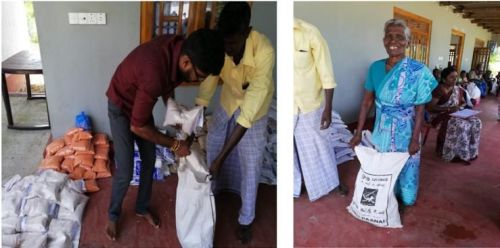
Food securityThe Scarcity of Food Escalating food prices and relative scarcity have led to ongoing food shortage. The problem in the north has been caused by the restrictions to fishing and agriculture by the maintenance of high security zones covering much of the coastline and vast areas of fertile land. The lack of rainfall in this arid zone has also accentuated the problem. Transport of food items from the south and the transport of agricultural produce from the north to other markets in the rest of the country is expensive due to the high fuel costs, thus contributing to further stagnation of the economy of the north. The children and the elderly living in the north are now facing hunger, starvation and malnutrition. As a result,children are growing up with poor weight and stature. Infants fall off the weight centile charts maintained by the Child Health Workers. Many of the elderly are destitute and dependent on the benevolence of temples and alms from the public. The state handouts of a few hundred rupees per month and rations of rice, lentils, flour and sugar barely last even a week. It is in order to address this situation, Oru Paanai was launched in the first place. This remains our primary objective even now. Oru Paanai Schools Programme Oru Paanai’s initial aim was to augment the mid-day meal programme funded by the World Food Programme (WFP). The WFP met the cost of rice and lentils only. OP assisted with the purchase of vegetables and condiments, as well as other requirements like firewood for the cooking. The schools in these impoverished areas welcomed the financial assistance provided by OP, which was always delivered in a timely and reliable fashion. From small beginnings, this OP Programme grew to the point where some 44,000 children in 311 schools were being helped by 2017. The heads of schools and education department officials were greatly appreciative of OP’s help, school attendance improved, and the children were doing better in their studies. All in all, we felt it was a useful helping hand that OP had extended to the people in the north. However, after nearly ten years of this programme, OP had to end its involvement when the WFP withdrew from Sri Lanka in December 2017. The Government of Sri Lanka took over the feeding programme and now provides a mid-day meal to the children on similar lines to that done in the rest of the country. OP and Sathu Maa provision From 2014, OP started assisting in the provision of Sathu Maa, a nutritional supplement, to undernourished children in some of the islands in the Jaffna peninsula. Since then, this project has been expanded to cover all the MOH areas in Jaffna peninsula. At present, Saththu Maa is provided to over 1,000 children in the Jaffna peninsula, every month. The project is done under the supervision of the MOH in each area. Oru Paanai spends over 1.2 million rupees per month on Saththu Maa provision. OP and the elderly In June 2018 , with the withdrawal of the World Food Program from Sri Lanka, the Government of Sri Lanka took over the provision of mid day lunch in all schools in the north of Sri Lanka. Oru Paanai, which had hitherto been supplementing the WFP mid day meal program, turned it’s attention to another neglected group, destitute elderly people living in the northeast as well as selected areas in the hill country. These were mostly people who were unable to earn a living in any way and had no support from family members. Oru Paanai initiated a program of dry rations distribution to this group of needy men and women in 2018. Initially, we provided dry rations packets to about 500 people in the Wanni district, on a 4 weekly basis, and the distribution of these dry rations was done in village halls, church halls and grama sevaka’s offices. As this trial program was warmly welcomed, we decided to extend the program to a wider area, including villages like Vavunathivu and Kiran in the eastern province and Nanu Oya and Belihul Oya in upcountry areas. At present, this dry rations program helps to provide security to around 1,600 recipients in these areas. All recipients are chosen with the help of local grama sevakas (village headmen) , who are well aware of the most needy men and women in their own patches. The dry ration parcels (pothis) consist of rice, rice flour, wheat, sugar and dhal, in adequate quantities to last for 4 weeks. The distribution is done with the help of local volunteers, under the supervision of Oru Paanai staff. At present, the dry rations program constitutes the main expenditure of the Oru Paanai charity. However, it is a fact that we meet only the needs of a limited number of people, and we could help many more people if we could raise more funds. There is a waiting list of people wo are also seeking our help through the dry rations program. OP help for young families From 2022, Oru Paanai has been providing dry rations to young families, in dire need of help to feed their children. Although we help only a small number of families at present, there is scope for expanding this project. |
